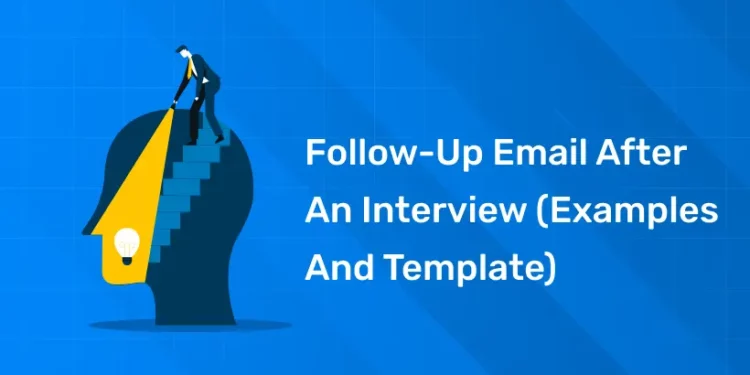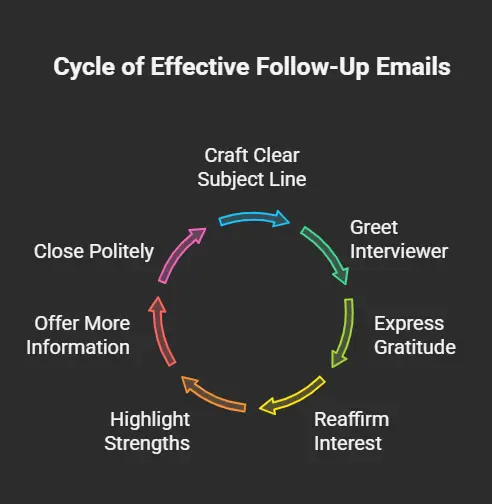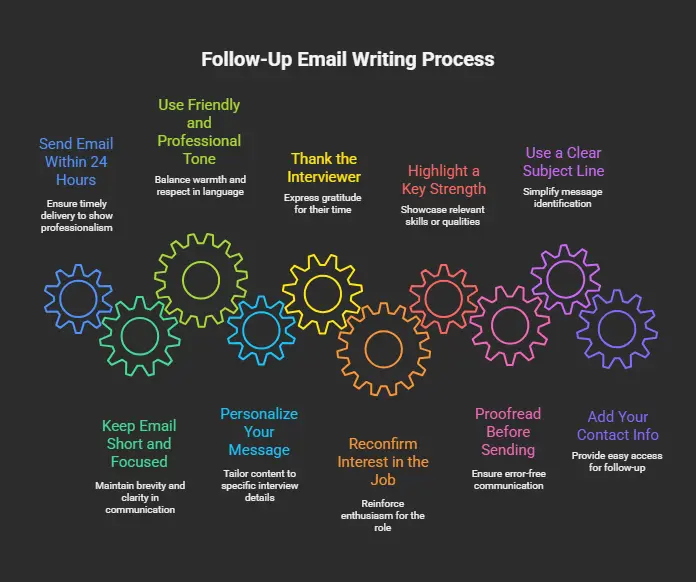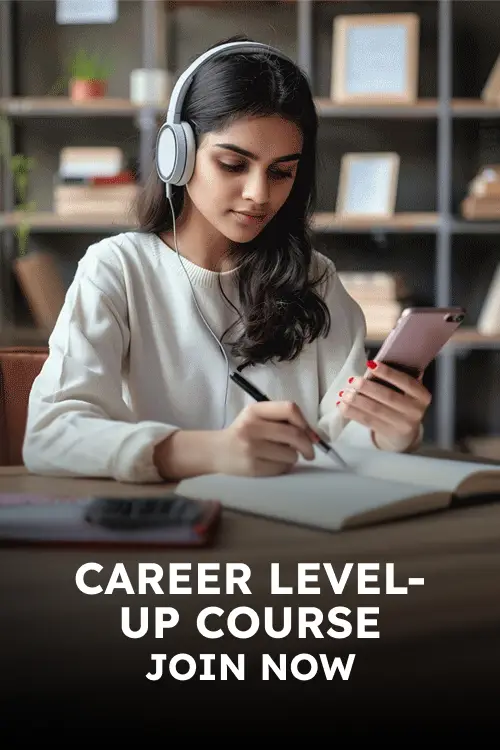Table of Contents
After the job interview, your hard work is not enough. One of the best thing you can do as next step after interview is to send a follow-up email. It is simple but effective manner to thank the interviewer and show your interest in the role and make the best impression.
A good follow-up email message can help you to stand out and keep you best in the interviewers’ mind. In this blog we will explain why follow-up email messages mean something, when we send them, and how to write the one with the examples and with helpful template.
Begin Your Personality Transformation- Enroll Today!
Introduction
A follow-up email after an interview is a simple but powerful way to leave a positive impression on your potential employer. It shows that you are professional, actually interested in role, and appreciate the interviewer’s time. More than just a thank you, a well-designed follow-up can strengthen your ability, highlight your enthusiasm and even help you stand out from other candidates. In this guide, we will share practical examples and easily used templates to write an effective follow-up of email you have telephone interviews, video calls or meetings.
What is Follow-Up Email after an Interview?
A follow-up email after an interview, a professional message was sent to the interviewer by a job candidate or to hire the team shortly after the interview. Its primary purpose is to express gratitude, repeat interest in the situation and strengthen the candidates profits. This type of email plays an important role in the overall recruitment process, as it can affect how a candidate is assessed and remembered.
Why It Matters:
A well-written follow-up email helps you create a positive impression and keep the communication lines open. In competitive job markets, such small gestures can separate a candidate from others with equal qualifications. It also shows strong communication skills, professionalism and an active attitude – which are valuable in every role.
Benefits of a Follow-Up Email:
- Gives your enthusiasm for a job
- Highlights your professionalism
- Provides a chance to explain or expand at any time discussed
- Keeping you the top of the mind with hiring officer
- Helps create a strong coordination with the interviewer
How to Write a Follow-Up Email?
Writing a follow-up email after an interview is an important step that can leave a lasting impression on the hiring manager. It’s your chance to say thank you, show that you’re still interested in the role, and remind them why you’re a great fit. Here’s a simple, step-by-step guide to help you write a strong follow-up email in a friendly and professional tone.
1. Use a Clear Subject Line
Start with a subject line that tells the recipient exactly what the email is about. Keep it simple and professional.
For example: “Thank You – John Doe Interview for Marketing Coordinator”
This helps the interviewer recognize your email quickly and keeps things organized in their inbox.
2. Greet the Interviewer by Name
Always begin your email with a respectful and friendly greeting. Use the name of the person who interviewed you.
For example: “Hi Ms. Johnson,”
This adds a personal touch and shows that you paid attention during the interview.
3. Express Your Gratitude
Say thank you for their time and the opportunity to interview. This shows good manners and appreciation.
For example: “Thank you so much for taking the time to speak with me yesterday. I enjoyed learning more about the team and the position.”
4. Reaffirm Your Interest in the Role
Let them know you’re still interested in the position. This helps show your enthusiasm and commitment.
Example: Our conversation made me even more excited about the opportunity to work with your team as a [Job Title].”
5. Highlight a Key Strength or Two
Briefly mention one or two skills or experiences that make you a strong fit for the job. Try to connect it to something discussed in the interview.
“With my background in [specific skill], I’m confident I can contribute meaningfully to your current projects.”
6. Offer to Provide More Information
Let the interviewer know you’re happy to answer any additional questions or provide more details.
Example: “Please feel free to reach out if there’s anything else I can provide to support your decision.”
7. Close with a Polite Ending
End on a positive note and sign off professionally.
For example: “Thanks again for the opportunity. I look forward to hearing from you soon.”
Then add: “Best regards, [Your Full Name]”
Boost Your Skills & Kickstart Your Career!
Employability and Personality Development Course by Entri App: Enhance your communication, confidence, and job-ready skills to excel in your career.
Join Now!Sample Emails and When to use them
Sending the follow-up email after an interview can allow you to keep in touch with the hiring team and show that you are really interested in that role. But it is important to choose the right message for the proper time. Below are some sample of email and tips on when to use each one.
1. Thank You Email – Right After the Interview
When to use it:
Send this within 24 hours of your interview to thank the interviewer and show your continued interest.
Sample Email:
Subject: Thank You – [Your Name]
Hi [Interviewer’s Name],
Thank you so much for talking to me today. I liked to learn more about [job title] position and team [company name].
I am excited about the opportunity to bring my skills into [mention skill] for my team and contribute to [company name].
Thanks again and I’m eager to hear from you soon.
Best regards,
[Your Name]
2. Second Follow-Up – If You Haven’t Heard Back
When to use it:
If it’s been about a week since your interview and you haven’t heard anything, this email helps you politely check in.
Sample Email:
Subject: Following Up on Interview – [Your Name]
Hi [Interviewer’s Name],
I hope you are doing well. I wanted to follow our interview for the [Job Title] role on [date]. Furthermore, I am still very interested in knowing and I would like to know, if there are any updates.
Tell me if you want anything else from me.
Best,
[Your Name]
3. Thank You Email After a Phone Interview
When to use it:
After a phone screening or phone interview to stay top-of-mind and show appreciation.
Sample Email:
Subject: Thank You for the Conversation – [Your Name]
Hi [Interviewer’s Name],
Thanks for the phone interview today. It was great to learn more about the [The company name] and [job title]
I am very interested in the next stages and will be happy to contribute to your team.
Looking forward to hearing from you.
Kind regards,
[Your Name]
4. Thank You Email After a Final Interview
When to use it:
After your final round of interviews, to reinforce your interest and thank the team.
Sample Email:
Subject: Thank You – Final Interview
Hi [Interviewer’s Name],
During the final interview I was happy to meet you and the team. I really appreciate the opportunity to welcome and know more about [company name].
I am very excited about the opportunity to contribute to your team and help [a specific challenge or project to name the project].
Thanks again and I look forward to your decision.
Best,
[Your Name]
Follow-up Email Templates
It is not always difficult to write a follow-up email after an interview. With the right words and tone you could say regards and highlight your interest in this role. A properly-written followup email let you stand out and maintain the interaction with the hiring team.
Below we are providing some simple and clear follow-up email templates that you can use, in each an every phase:
1. Basic Follow-Up Email After a First Interview
Subject: Thank You – [Your Name]
Hi [Interviewer’s Name],
Thank you for spending your valuable time to talk me today. I am excited to learn more about your team at [job position] and [company name].
Our conversation made me even more excited about the opportunity to join your team and contributed to [mention something you discussed].
Tell me if you need further information. I am eager to hear about the further steps.
Best regards,
[Your Full Name]
[Your Contact Information]
2. Follow-Up Email After a Second or Final Interview
Subject: Great Speaking With You Again – [Your Name]
Hi [Interviewer’s Name],
It was great to meet you again and know more about the team and the role. I appreciate the time when you and team [company name] talked to me.
I am very excited to join your team and the opportunity to contribute to [mention the project or goal]. Feel free to contact if you want to know something else from me.
Looking forward to hearing from you soon.
Best,
[Your Full Name]
[Your Contact Information]
3. Follow-Up Email If You Haven’t Heard Back
Subject: Checking In – [Your Name]
Hi [Interviewer’s Name],
I hope you are doing well. I wanted to check in the [job title] the post, which I interviewed for [date of interview]. Likewise, I am still very interested in the opportunity and would like to know if there is any update on the hiring process.
Tell me if you need further information on my part. I look forward to hearing from you.
Kind regards,
[Your Full Name]
[Your Contact Information]
Tips for writing a Follow-Up Email after an Interview
1. Send It Within 24 Hours
Timing is important. Try to send your follow-up email within a day after your interview. This shows that you’re professional, organized, and genuinely interested in the job while the conversation is still fresh in the interviewer’s mind.
2. Keep It Short and Focused
Your follow-up doesn’t need to be long. A few clear paragraphs (around 150–200 words) is enough. Get straight to the point—thank the interviewer, express your interest, and mention one or two key strengths.
3. Use a Friendly and Professional Tone
Write your email in a warm and respectful tone. Avoid slang or overly casual language, but don’t sound too stiff either. Think of it like talking to a colleague you respect.
4. Personalize Your Message
Avoid using a generic email for every job. Mention something specific from your interview—maybe a topic you discussed or a question they asked. This shows that you were engaged and truly listened.
5. Thank the Interviewer
Always thank the person for their time and the opportunity to interview. A simple sentence like, “Thank you for taking the time to speak with me yesterday,” can go a long way in showing appreciation.
6. Reconfirm Your Interest in the Job
Let them know you’re still very interested in the role. You can say something like, “I’m even more excited about the possibility of joining your team after our conversation.”
7. Highlight a Key Strength
Briefly remind them of something you bring to the table. Maybe a skill, a past success, or a quality that fits what they’re looking for. Keep it short and relevant.
8. Proofread Before Sending
Make sure there are no typos or grammar mistakes. Read your email out loud before you send it. A clean, error-free message shows attention to detail.
9. Use a Clear Subject Line
Keep the subject line simple and relevant. Something like “Thank You – [Your Name], [Job Title] Interview” makes it easy for the interviewer to recognize your message.
10. Add Your Contact Info
Always include your full name and the best way to contact you (like your phone number or email) at the end of your message. This makes it easy for them to reach out if they need to follow up.
Begin Your Personality Transformation- Enroll Today!
Boost Your Skills & Kickstart Your Career!
Employability and Personality Development Course by Entri App: Enhance your communication, confidence, and job-ready skills to excel in your career.
Join Now!Conclusion
Sending a followup email after an interview is simple and which can make a big difference. It makes you humble, professional and really interested in jobs. It also offers you a chance to remind the company why you perfect for the role.
By setting your message prepared, friendly and on time, leave an effective impression that will let you stand out from other applicants. Whether it is your first interview or the last round, a simple “Thank You” email, you can go a long way to make a strong relationship with the hiring team.
| Related Links | |
| Top Communication Skills For A Resume | Verbal Communication Skills: Examples & How To Improve Them |
| Cover Letter Do’s and Dont’s | What Does a Group Leader Do? |
Boost Your Skills & Kickstart Your Career!
Employability and Personality Development Course by Entri App: Enhance your communication, confidence, and job-ready skills to excel in your career.
Join Now!Frequently Asked Questions
Why is sending a follow-up email after an interview important?
A follow-up email shows appreciation for the interviewer’s time, reinforces your interest in the role, and gives you a chance to highlight key points from the interview. It also helps you stand out among other candidates by showing professionalism and strong communication skills.
When should I send a follow-up email after my interview?
The best time to send a follow-up email is within 24 hours after your interview. This keeps your name fresh in the interviewer’s mind while showing that you’re prompt and genuinely interested in the position.
What should I include in a follow-up email?
A good follow-up email should include a thank-you message, a brief mention of something specific discussed during the interview, a reminder of your interest in the position, and a polite note about looking forward to next steps.
Should I follow up after every type of interview?
Yes, it’s a good idea to send a follow-up email after all types of interviews—whether it’s in-person, virtual, phone, or a second-round interview. It reflects your consistent professionalism and attention to detail.
What if I don’t hear back after sending a follow-up email?
If you haven’t heard back within a week or the time frame given during the interview, it’s okay to send a polite check-in email. Keep it short and respectful, and avoid sounding impatient or demanding.
Can a follow-up email really make a difference in the hiring decision?
Yes, it can. While it won’t replace your qualifications, a thoughtful and well-written follow-up email can show strong communication skills, professionalism, and genuine interest—all of which can influence the hiring manager’s impression of you.













